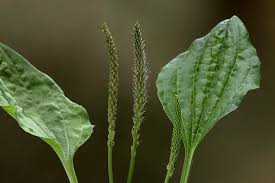
Plantain grows everywhere! It is in many people’s lawns and spreads readily. Some feel plantain is an obnoxious weed but don’t let it fool you. It is pretty incredible! In survival situations, there are a few ‘weeds’ that you need to know for first aid purposes and plantain is one of them! Don’t confuse it with plantain that in the banana family…this is totally different.
Plantain comes in two forms: Narrow leaf (plantago lancilata) or broad leaf (plantago major). Narrow leaf plantain has three to five prominent ribs that stripe its long narrow leaves. Broadleaf plantain has five to seven non-prominent veins that strips its wide oval shaped leaves. Each are very widely found in many backyards. Plantain is an herbaceous perennial that can be eaten in salads or put into soups. It can also be used to make teas, make into a tincture, or used as a poultice.
One of the most traditional uses for this herb is for lung health. Plantain leaves are rich in mucilage which gives the respiratory tract protection. It moistens and coats the airways with a protective layer which reduces the irritation that causes a dry cough. Researchers in Bulgaria found that plantain leaves were effective against chronic bronchitis. Containing glycerin and pectin, plantain exerts a soothing effect on the lungs, provoking the production of more mucus which helps to relieve discomfort and irritation.
Another use for plantain is for boosting the immune system. Plantain leaves are high in vitamins A and vitamin C. It helps reduce inflammation and combat infection by depriving bacteria of nutrients. Plantain can also help with digestion, because of its anti-inflammatory properties, and it works wonders on the gastrointestinal system. It can treat chronic colitis, acute gastritis, enteritis, and enterocolitis. It can treat these health concerns because of it soothing properties.
I personally love plantain for its amazing ability to pull out poisons or venom from bees, spiders, snakes, or any kind of bug bite. It also stops bleeding, heals bruises, alleviates ulcers, and prevents infections. I am personally high allergic to wasps and bees. Being stung could be a life or death situation for me. Unfortunately on my homestead, I am gardening outside a lot and I have been stung many times. The moment I get stung, I find plantain and I immediately chew it in my mouth and spit it out onto the sting. This is called a spit poultice. I leave it on the sting between thirty minutes to an hour and when I take the poultice off, it is hard to find where I was stung. The plantain has pulled all the poison out of my skin. As a doctor of natural medicine, I studied this in graduate school. I knew it was possible but until I actually put it into practice, I didn’t realize just how good it would work. I surprised myself the first time this happened.
I went ahead and made a plantain tincture so that I can have it on hand if I am every stung or bitten in the winter months when plantain is not as plentiful. It also only has about a six month shelf life (although it can be frozen) so I always have plantain tincture on hand. It came in handy when I was stung on my scalp. No way to get a spit poultice on the area well with all my thick hair. It just took a squirt or two and I was feeling immediate relief.
Next time you get stung, know plantain so that you can grab it. You will know that a spit poultice can not only give you relief, but it can also help pull the poison and stinger out.
If you want to purchase this herb, please consider using this affiliate link to purchase it. I highly recommend this link because of how they process and store herbs. You can’t always trust who you purchase from online, but with this company, I truly do feel it is top of the line and high quality. Just go to this link and type in ‘Plantain’.
If you would like to find out more about the author or learn about other herbs, please consider visiting this link.
Stay natural!
~Dr. Amanda P. Cartwright